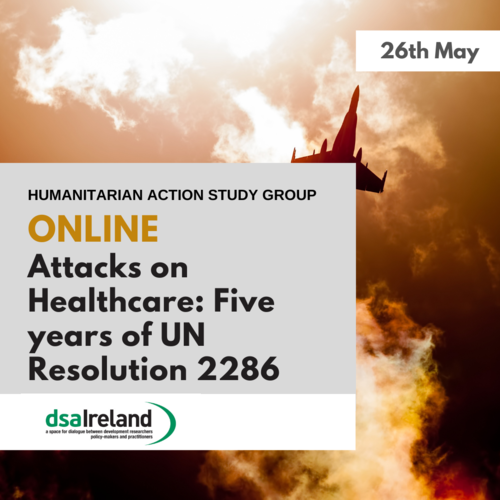When: Wednesday 26th May, 4:00 PM – 5:00 PM IST
Registration: Register here
Join our Humanitarian Action Study Group on May 26th for this discussion and insights into the effect of UN Resolution 2286, the threats to healthcare in conflict zones and complex humanitarian contexts today, and what can be done to protect patients, staff and medical facilities in such contexts.
In May 2016, the UN Security Council passed UN Resolution 2286, ‘strongly condemning attacks against medical facilities and personnel in conflict situations’. Five years on, patients, medical workers and medical facilities in conflict zones remain at real risk. To examine the effect of Resolution 2286 and the current threats to patients, healthcare staff and health facilities in armed conflict settings, Médecins Sans Frontières Ireland, the Irish Red Cross and DSA Ireland’s Humanitarian Action Study Group host this online event, ‘Attacks on Healthcare: Five years of UN Resolution 2286’.
Speakers:
- Maciej Polkowski – Head of the ICRC Healthcare in Danger Initiative
- Dr. Maria Guevara – International Medical Secretary, MSF
About:
As recognised in International Humanitarian Law and reaffirmed in Resolution 2286, hospitals and health facilities should be one of the few safe places in a conflict zone. Yet in the five years since Resolution 2286 was passed, attacks on healthcare have continued unabated, depriving vulnerable communities of essential health services and placing the lives of patients and healthcare workers in danger. The ICRC recorded 3,780 attacks on healthcare in the years 2016-2020 and according to WHO data, of the 231 attacks so far this year, countries with the most reported attacks include Afghanistan, Syria, Yemen and Myanmar.
From doctors having to hide in cellars in Syria to provide surgical care, to the more recent occupation of health facilities by soldiers in Tigray, Ethiopia, the commitment of states to protect patients, medical personnel and facilities remains hollow when it comes down to the conduct of hostilities – particularly in conflict contexts where a "counter-terrorism" narrative is used by a state. States’ continued failure to protect patients and healthcare is even more pressing against the backdrop of a global health crisis, which has shone a spotlight on the vulnerabilities and inequities of health systems around the world.
As the protected status of the medical mission continues to be violated with apparent impunity by both non-state and state parties to conflicts, what has UN Resolution 2286 done for the people it was intended to help? With Ireland continuing its elected membership of the UN Security Council, what responsibility does the UNSC and its members have in enforcing the resolution and what concrete measures can they take to reinforce the protection of impartial medical care?
Furthermore, what responsibility does the UNSC have in ensuring humanitarian action is not criminalised in addition to not being attacked?
And what can humanitarians, healthcare workers and civil society do to remind states of their commitments to the protection of the medical mission under Resolution 2286?
